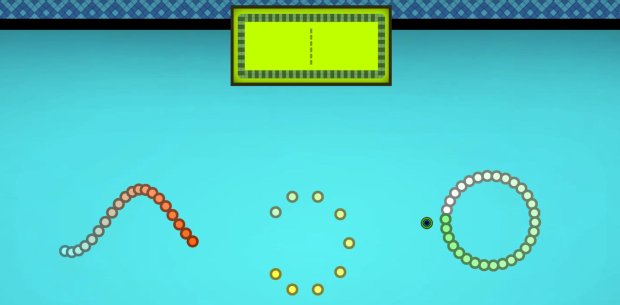Engare is a beautiful puzzle game of Islamic art and spirographs
GEOMETRIC!
In an attempt to teleport some geometric Islamic art from one location to another, developer Mahdi Bahrami failed to notice a spirograph had flown into the telepod. That's my theory anyway. The result is a very beautiful, very relaxing puzzle game called Engare.
Engare is an exploration of the intricate and beautiful geometric art that typically decorates the interior of a mosque, combined with that old mathematical question about what shape is drawn when you trace a dot on a moving shape. It is, Bahrami explained when talking to Killscreen's Chris Priestman a few months back, about "What will happen if I add a short line to one of the tiles in a mosque? If we take into account the tiling rules of the mosque, what would the whole wall look like after we add the line? What if we change the rules? What would the mosque ceiling look like?"
It's also about playing with a spirograph to make pretty patterns, while some delightful music dances along in the background.
The core concept in each level is to attempt to repeat the target pattern by placing a dot somewhere on an animated object, such that it traces the desired shape. This starts off relatively simply, asking you to find a way to create a straight line from a rolling ball (the original maths lesson question that first inspired the game), and ends asking you to experiment, play, guess even, where on a tri-pivoted arm you might plop a dot to draw a wonderful, intricate looping design. As the levels progress you are then given the capacity to lengthen and shorten arms, increase the rotation speeds, or rearrange the shapes, in order to fathom a means to draw the goal.
Oddly enough, if Engare has a weakness, it's that despite this seeming complexity it's always very easy. I blitzed through the game in about an hour, albeit an extremely enjoyable one. Because, I suppose, Engare had a very fine line to walk. As a toy, a spirograph is fun because you don't really know what pattern you're going to make as you start looping your pencil through the rotating plastic shapes. But as a puzzle, to be satisfying you really need to feel some inclination about whether your dot placement is going to get close to the desired result. Engare had to find a midpoint between randomness and rewarding, and I suspect there was never a satisfactory balance that didn't end up feeling particularly easy. As soon as it isn't, it'd likely only be unfair.
What's key here is how smartly everything is implemented. Repeated attempts at a puzzle require nothing more than just placing the dot again, while failed attempts leave a grey ghost after the tracing has finished, making a useful guide for another try. By the time the game's introduced the sliders, it's also simplified the obviousness of where the dot goes, meaning it doesn't become an impossible fog of guesswork. And when things get fast, you can always right-click to slow things down to drop a dot. The only thing missing is the ability to speed things up as well, in order to bring a rotating arm or looping series of concentric circles back to the starting position you need.
It also shows its smarts in its pattern recognition. It doesn't require outlandish precision, but seems able to recognise that your design is just about right, and then when a puzzle's complete often continues your particular pattern to create a much more elaborate shape purely for the sake of prettiness, and then colours it in. It's your own, and it feels lovely to see your bespoke solution get this treatment.
The music by Mim Rasouli is superb throughout, shifting and changing with each set of levels, the sort I was happy to just leave looping in the background when I was alt-tabbed out of the game. And while the art isn't particularly outstanding, it does the job.
Once you've finished the game, you can access something that feels like it's supposed to be a level editor, but in the end is more just a toy for making pretty patterns. It'd be lovely to see this developed into something that could be shared via Steam Workshop, to let people share interesting designs with others, giving a very short game a lot more longevity.
Engare is definitely too short - more levels would have been very welcome. And it's definitely very simple. It's testament to what a smart and interesting game it is that neither of these things put me off. In fact, it's a game that just kept putting a smile on my face as I solved each level. I'm normally the sort to find completing a puzzle almost annoying, as it means the puzzle's over and I just want to start the next, but Engare made me grin each time I'd gotten it right. And perhaps more importantly, also when I'd gotten it wrong. Because either way, I'd made a pretty pattern.
Engare is out now on for Windows and Mac at £5/$7/7€, via Steam (currently 15% off) or the game's own site.



